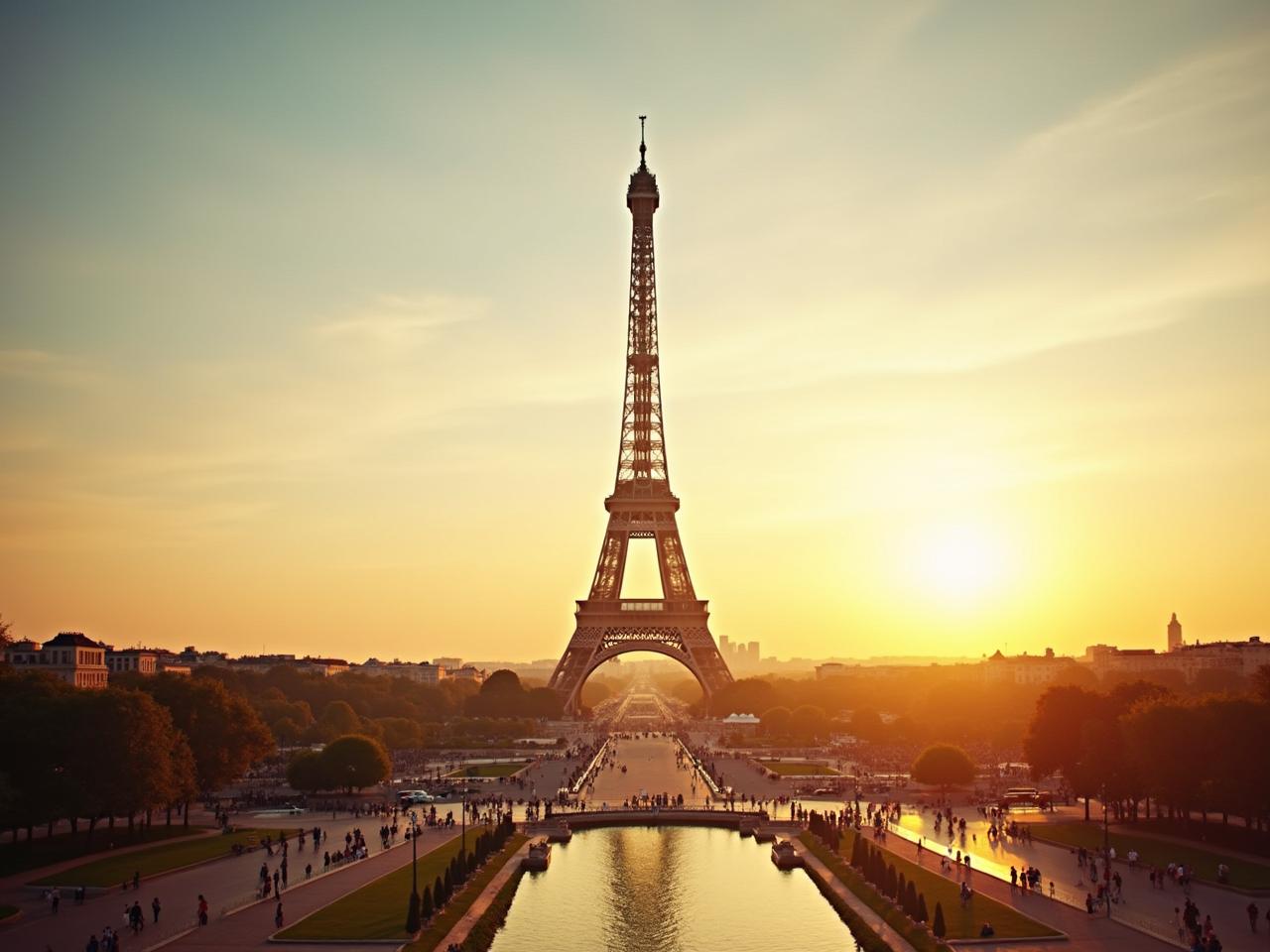Franciaország megtestesíti a romantikát, a hangulatot és a kulináris remekműveket. A lélegzetelállító tájak, a gazdag történelem és a híres kultúra miatt nem csoda, hogy ez az ország kedvelt úti cél. Az utazók özönlenek Franciaországba, hogy élvezzék a nyüzsgő utcákat, élvezzék a finom ételeket, és megcsodálják az olyan ikonikus nevezetességeket, mint az Eiffel-torony és a Louvre Múzeum. Ez a cikk elmerül a híres francia dolgokban, amelyek miatt Franciaországot kötelezően meg kell látogatni, és feltárja, miről híres Franciaország.
Melyek Franciaország leghíresebb nevezetességei?
Franciaország a történelem, a kultúra és a lélegzetelállító építészet gazdag szövevényéről ismert, és a világ leghíresebb nevezetességeinek ad otthont. Franciaország nemcsak festői tájairól híres, hanem rendkívüli történelmi helyszíneiről is, amelyek közül sok az UNESCO világörökségi státuszával rendelkezik. Íme a leghíresebb helyszínek:
- Eiffel-torony: Franciaország jelképe és a világ egyik leghíresebb nevezetessége.
- Notre Dame katedrális: A lenyűgöző gótikus építészetéről ismert, figyelemre méltó katedrális a francia történelem egyik fontos része.
- Versailles-i kastély: Az UNESCO világörökség részét képező extravagáns, a királyi fényűzést és történelmet példázó helyszín.
- Diadalív: A francia főváros szívében található, a Franciaországért harcolók tiszteletére emelt híres emlékmű.
- Francia Alpok: A lélegzetelállító hegység híres a síelésről és a túrázásról, ami népszerű úti céllá teszi.
- Mont Saint-Michel: Ez a festői építészetéről ismert szigetközség az UNESCO világörökség része, és Franciaország egyik leghíresebb helyszíne.
- A Louvre Múzeum: A Mona Lisa és számos más remekmű otthona, a leghíresebb múzeumok közé tartozik, ahol neves művészek alkotásai láthatók, ezért népszerű úti cél.
- Sainte-Chapelle: A lenyűgöző katedrális, amely rendkívüli ólomüveg ablakai miatt ismert, és amely a mindennapi életben az istenit ábrázolja - ez is az UNESCO Világörökség része.
- Pont du Gard: Egy ókori római vízvezeték, amely a mérnöki munka figyelemre méltó bizonyítéka, és amely lenyűgöző szerkezetéről és történelmi jelentőségéről híres.
- Château de Chambord: A Loire-völgy ikonikus palotája, amely a francia reneszánsz építészet jelentős példája és az UNESCO világörökségének egyik nevezetes helyszíne.
Ezek a helyszínek csak egy kis ízelítőt nyújtanak abból, ami Franciaországot a kultúra és a történelem kincsesbányájává teszi. Minden egyes helyszínnek megvan a maga egyedi története és varázsa, amely arra invitálja az utazókat, hogy fedezzék fel ennek a varázslatos országnak a sokszínűségét!
Mitől olyan híres a francia konyha?
Ha a híres francia dolgokat vesszük figyelembe, a kulináris élvezetek állnak a lista élén. A francia konyha az ízek és hagyományok gazdag szövevénye. Az olyan világszerte ismert ételek, mint a coq au vin és a bouillabaisse a művészi kultúrát mutatják be.
A francia konyha különböző regionális stílusokat mutat, a kiadós normandiai ételektől a finom párizsi süteményekig. A francia séfek olyan technikákat sajátítanak el, amelyeket sokan szeretnének megtanulni, és amelyeket mindenhol a konyhai iskolákban ünnepelnek.
A vajas croissant vagy a dekadens crème brulée egy kávézóban való fogyasztása élvezetes. A francia konyha nem csak a gyomrot, hanem a lelket is táplálja.
Franciaország kulináris hírnevének egyik kulcstényezője a friss, helyi alapanyagok hangsúlyozása. Az ország gyümölcsökkel, zöldségekkel, sajtokkal és húsokkal teli, élénk piacokkal büszkélkedhet. Ez a minőség iránti elkötelezettség olyan étkezési élményt teremt, amely tükrözi a helyi kultúrát - minden falat egy történetet mesél el, így a francia konyha magával ragadó.
Milyen finomságokat kínál a francia sajt, a bor és a pezsgő?
Valaki sajtot mondott? Franciaország a sajtkultúra megtestesítője, ahol minden sarkon találunk ízletes fajtákat. A csípős Roquefort-tól a krémes Brie-n át a dekadens Camembert-ig a sajtválaszték az ország változatos tájait tükrözi. Sok sajtkészítési technika több évszázados múltra tekint vissza, ami hitelessé teszi a kóstolás élményét.
A sajtok mellé Franciaország lenyűgöző borválasztéka is társul. Az olyan régiók, mint Bordeaux, Burgundia és Champagne mindegyike egyedi ízeket termel, amelyek tökéletesen illenek a hagyományos francia konyhához. A borkultúra annyira szerves része, hogy az ételekkel párosítva emlékezetes élményeket nyújt, és minden étkezést feldob.
A helyi piacok felfedezése, ahol kézműves sajtokat és borokat kóstolhatunk, átformáló hatással lehet. Minden egyes falat vagy korty elmesél egy történetet, és elrepít a napsütötte legelőkre vagy a szőlőhegyekre.
Miért ismert Franciaország a francia Riviéra?
Á, a francia Riviéra! A Côte d'Azur e csillogó része évtizedek óta elvarázsolja a hírességeket és az utazókat. Ez Franciaország egyik legnépszerűbb turisztikai célpontja, lenyűgöző mediterrán tengerpartjával, amely tele van luxus üdülőhelyekkel, elegáns butikokkal és bájos régi városokkal.
Nizza csillogó tengerpartjaitól Monaco fényűzéséig ez a régió a szabadidő és a luxus megtestesítője. Az évente megrendezésre kerülő Cannes-i Filmfesztivál a sztárokat vonzza, és a Riviérát kulturális fellegvárként tartja számon. A káprázatos kilátás és a festői táj felejthetetlen élménnyé teszi a Francia Riviéra meglátogatását.
A Riviéra azonban nem csak a nagyvilági életről szól, hanem olyan festői falvakról is ismert, mint Saint-Paul-de-Vence. Ez a falu a helyi művészek és kézművesek otthona. A macskaköves sikátorokon sétálva lélegzetelállító kilátás nyílik a Földközi-tengerre. A természeti szépség és a kultúra keveredése garantálja, hogy a francia Riviérára tett kirándulás emlékezetes marad.
Hogyan alakította a francia forradalom a modern francia kultúrát?
A francia forradalom a világtörténelem egyik legmeghatározóbb eseménye. Az 1789-ben kezdődő forradalom olyan eszmei láncreakciót indított el, amely a modern demokráciához vezetett. Franciaország a szabadság, egyenlőség és testvériség radikális eszméiről ismert. A forradalom megkérdőjelezte a status quo-t, és eltörölte a feudális kiváltságokat, jogokat hirdetett mindenki számára, beleértve a nőket is, akik később megtalálták a hangjukat.
Talán hallottál már a Bastille ostromáról; ez a zsarnokság elleni lázadást szimbolizálja. A forradalom olyan ikonikus alakokat hozott létre, mint Maximilien Robespierre és Bonaparte Napóleon, akiknek reformjai éveken át formálták a nemzetet. A francia történelem gazdagsága és e viharos időszak eszméi továbbra is inspirálják a politikai gondolkodást.
Nem beszélhetünk a forradalomról a művészet említése nélkül. Ebben a korszakban a művészi kifejezésmód robbanásszerűen megnőtt, és a hazafiság és az emberi jogok témáira összpontosított. Ez az alkotói teljesítmény nemcsak Franciaországot alakította át, hanem az európai művészetben és kultúrában is maradandó nyomot hagyott.
Milyen híres dolgokról ismert Franciaország?
A francia kultúrában való elmerülés az irodalom, a művészet, a filozófia és a zene kincsesbányáját tárja fel. Victor Hugo mélyreható műveitől Claude Monet varázslatos festményeiig Franciaország a világ leghíresebb gondolkodóinak és alkotóinak otthona.
A francia irodalmi hagyomány gazdag és változatos: olyan szerzők, mint Gustave Flaubert, kísérleteznek az elbeszélői technikával, Charles Baudelaire költészete pedig az emberi érzelmek összetettségét ragadja meg. Az egzisztencializmus eszméje Franciaországban olyan gondolkodók révén vert gyökeret, mint Jean-Paul Sartre és Simone de Beauvoir, akiknek filozófiája a szabadságot, a választást és az emberi létet vizsgálta.
A művészet és a kultúra is mélyen összefonódik a francia identitással. Az olyan híres múzeumok, mint a Louvre és a Musée d'Orsay olyan remekműveknek adnak otthont, amelyek évente több millió látogatót vonzanak. A modern francia filmművészet, amely olyan rendezőknek ad otthont, mint François Truffaut és Agnès Varda, továbbra is világszerte hatással van az iparágra. Tagadhatatlan, hogy a francia kultúra kitörölhetetlen nyomot hagyott a világon.
Miért ünneplik világszerte a Tour de France-t?
A Tour de France kerékpárversenyből kulturális jelenséggé vált. Ez a kimerítő verseny a világ minden tájáról vonzza az elit sportolókat. Három héten és 3500 kilométeren keresztül próbára teszi az állóképességet és a stratégiát Franciaország festői tájain.
1903 óta a Tour de France a francia kultúra szimbólumává vált. Rendkívüli régiókat mutat be, a zord Alpoktól a festői Loire-völgyig. A bajnok által viselt sárga trikó a teljesítményt és a kitartást jelképezi.
A túra megtekintése élénk élményt jelent, mivel a közösségek ünnepléssel és éljenző tömeggel elevenednek meg. A verseny nem csak a kerékpározásról szól; a bajtársiasságot, a sportszerűséget és a francia vidék lenyűgöző szépségét ünnepli. Akár szereti a kerékpározást, akár nem, a Tour de France megtekintése a nemzet szenvedélyét és szellemét mutatja be.
Mire számíthatunk a cannes-i filmfesztiválon?
A Cannes-i Filmfesztivál a művészet és a csillogás keverékét mutatja be a filmiparban. Minden évben az iparág vezetői, színészek és filmkészítők a világ minden tájáról összegyűlnek ebben a tengerparti városban, hogy bemutassák munkáikat. A legrangosabb filmfesztiválok egyikeként alapvető fontosságú ismertséget biztosít a független filmeknek, és elismeri a jelentős filmes teljesítményeket.
A résztvevők lenyűgöző vörös szőnyeges pillanatokban gyönyörködhetnek, ahogy az A-listás hírességek haute couture ruhákban sétálnak. Cannes azonban nem csak a csillogásról és a csillogásról szól; olyan történeteket is bemutat, amelyek megkérdőjelezik a társadalmi normákat és sürgető globális problémákkal foglalkoznak.
A francia kultúra részeként a cannes-i filmfesztivál elősegíti a sokszínű történetmesélés iránti elismerést, és betekintést nyújt a mai filmművészetet formáló művészeti irányzatokba. A filmek iránt szenvedélyesen érdeklődők számára a fesztiválon való részvétel olyan, mintha egy olyan világba lépnének be, ahol a kreativitás és a képzelet uralkodik.
Chat vége
Kijelentkezés
Mennyire fontos a francia nyelv a kultúra számára?
A francia nyelvet gyakran a szerelem nyelvének tekintik, de a globális kultúrában sokkal mélyebb jelentősége van. Nemcsak a kommunikáció eszköze, hanem a francia kultúra és hagyományok hordozója is. A nyelv pontossága és árnyaltsága gazdag kifejezési lehetőségeket biztosít az irodalomban, a művészetben és a filozófiában.
A francia nyelvet milliók beszélik szerte a világon, és hatása túlmutat Franciaországon. Mivel a francia nyelv a nemzetközi intézmények egyik hivatalos nyelve, a francia nyelv ismerete megnyitja az ajtókat a különböző kultúrák és a globális diskurzusok megértéséhez.
Emellett a francia irodalom tele van klasszikusokkal, René Descartes filozófiai írásaitól Paul Éluard szenvedélyes költészetéig. A nyelv olyan eleganciával rendelkezik, amely fokozza a művészi kifejezésmódot, és létfontosságúvá teszi azon nemzetek kulturális szövetében, ahol beszélik.
Mitől emelkedik ki a francia divat globálisan?
Á, Párizs - a világ divatfővárosa. A francia divat időtlen és folyamatosan fejlődő, olyan tervezők és házak, mint a Chanel, a Dior és a Louis Vuitton folyamatosan feszegetik a stílus határait. A francia divat tükrözi az ország gazdag kulturális örökségét, az elegancia, a kifinomultság és egy bizonyos je ne sais quoi keverékével, amely magával ragad.
Az olyan események, mint a Párizsi Divathét, nemzetközi figyelmet vonzanak, bemutatva a legújabb trendeket a neves tervezőktől a feltörekvő tehetségekig. A francia divat elérhető, és a lakosok mindennapi ruhatárában erős az utcai stílus hatása. A francia stílus művészetét a sikk és a lazaság egyensúlyának ez a képessége testesíti meg.
A francia divat lényege nem csak a ruhadarabokban rejlik - ez egy attitűd, az identitás vállalása, amely az egyéniséget ünnepli. Legyen szó haute couture-ről vagy egyszerűségről, a francia divat olyan örökség, amelyet érdemes felfedezni.
Kik azok a híres franciák, akiket ismerned kell?
Ha híres franciákról gondolkodunk, a lista éppoly illusztris, mint amilyen hosszú. Említsünk csak néhányat: Victor Hugo, az irodalmi óriás, akinek művei, mint például a "Nyomorultak", még mindig visszhangot keltenek a kulturális különbségeken túl; és Coco Chanel, a forradalmár divattervező, akinek hatása még ma is meghatározza az iparágat.
Ezek a személyiségek - számtalan más személyiséggel együtt - a francia történelem gazdag szövevényét tükrözik: azoktól, akik a művészetek és a tudományok határait feszegették, azokig, akik hozzájárultak a társadalmi változásokhoz. Emlékeztetnek Franciaország határozott szellemére és a tudás, a szépség és a szabadság iránti rendíthetetlen törekvésére.

 Miről híres Franciaország: Híres francia dolgok">
Miről híres Franciaország: Híres francia dolgok">

Megjegyzések